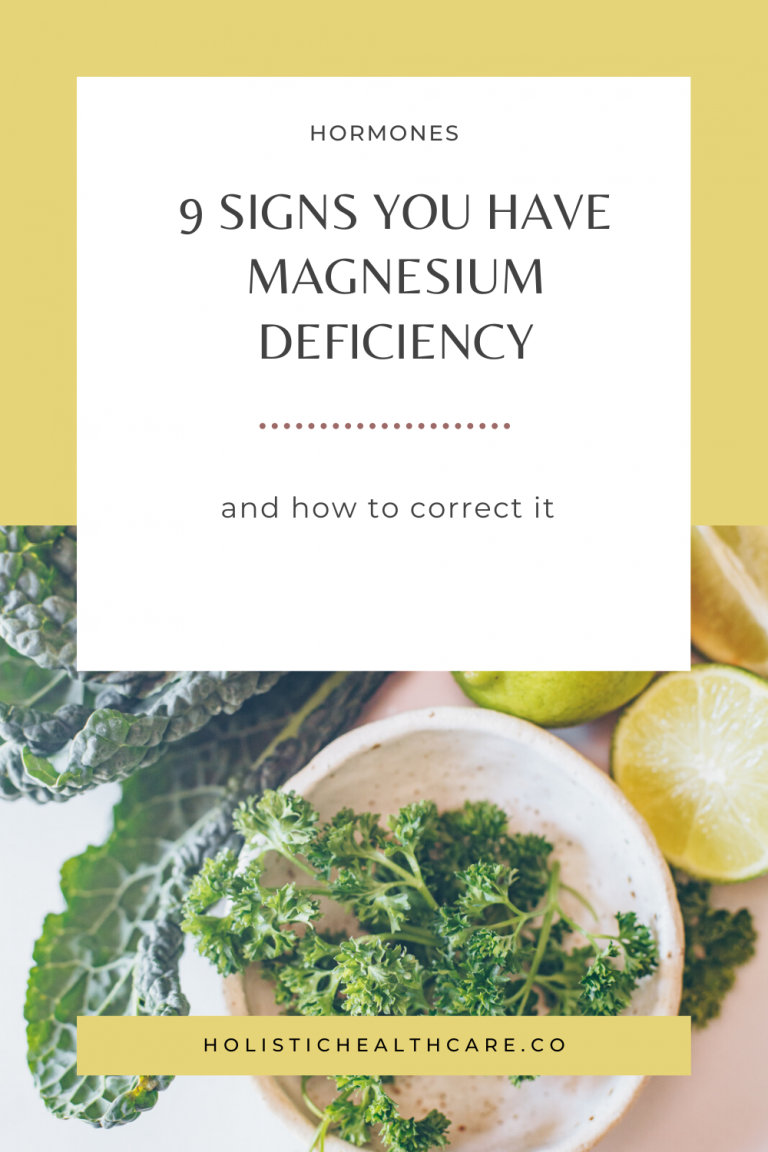
9 Signs of Magnesium Deficiency
& How to Correct It
Researches have shown that magnesium plays an even greater role in health than was previously thought.
Second only to potassium in terms of concentration within the individual cells in the body (intracellular concentration), magnesium is required for over 200 hundred biochemical reactions or processes taking place within your body.
Like zinc and other minerals, magnesium’s role revolves primarily around its ability to activate many enzymes.
If you haven’t been researching on the depletion of minerals our soils, it might surprise you to learn that somewhere close to 100% of people in the UK are not meeting the recommended daily allowance (RDA) for magnesium.
According to the National Diet and Nutrition Survey, average daily intakes of magnesium for adult men and women in the UK are 308mg and 229mg respectively.1With an RDA of 375mg, this means that virtually the entire UK population would be considered magnesium deficient.2
Poor soil, intensive farming, the use of artifical chemicals/fertilizers and extensive food processing methods now make it very difficult to get enough magnesium in our diets and consequently have contributed to widespread deficiencies in this vital mineral.
This significantly increases the need for high strength supplementation to restore optimal levels.
Added to this, our fast-paced modern lifestyles and reliance on many refined foods and processed foods (which tend to have a very low magnesium content) means that most people are not getting anywhere near enough magnesium in their diets.
Key Roles of Magnesium
Essential for energy production
Magnesium is perhaps the most important nutrient involved in the body’s energy production processes.
This is not just particularly significant for athletes and sports people but to enable energy production for everyday activities too, hence why general feelings of fatigue and lethargy are common symptoms of a deficiency of this important mineral.
Our adrenal glands need Magnesium along with zinc, vitamin B complex & vitamin C to keep up with cortisol and adrenaline production in order to help us cope with extra stress and demand on our adrenals.
Low levels of Magnesium can impair this process which reduces your resilience and ability to cope with stress an can predispose you to adrenal fatigue and chronic fatigue syndrome.
Optimal muscle function
Muscles actually contain about 26% of all magnesium found in the body, with 60% in bone and the rest in soft tissue and body fluids.
Muscle cramps, spasms and tremors are common symptoms of magnesium deficiency.
Nature’s tranquilliser
A recent study published in the Journal of the American College of Nutrition3 found that a deficiency of magnesium intensified adverse reactions to stress.
Magnesium deficiency can commonly lead to symptoms of mood swings, irritability and depression.
Certainly some of my clients have found supplementing with magnesium has been wonderful to aid sleep and restfullness.
Signs you could be low on Magnesium
Low Energy: physical and mental fatigue, chronic fatigue, lethargy, poor memory and concentration
Poor Mood: depression, anxiety, sleeplessness, stress, insomnia,tension headaches, irritability
Physical Performance: low energy production, poor cardiovascular fitness, muscle cramps and weaknesses
Magnesium rich foods:
• Green leafy vegetables
• Unrefined grains
• Nuts such as almonds & cashew nuts
• Legumes such as beans, pulses & lentils
• Soy products such as tofu, soy milk and yoghurts
• Whole grains such as brown rice and millet
Magnesium Supplements
There are many on the market.
Aim for Magnesium bisglycinate or food state magnesium which are the best absorbed with the least adverse effects.
Generally there is little to no adverse effects with Mg supplementation other than loose stools if you take too much or in the citrate form.
Most of the time, low absorption is more of an issue such as Magnesium oxide.
Magnesium oxide is often used as a laxative as it acts through an osmosis effect to draw water into the bowel to soften the stools.
My personal favourites are Nutri MegaMag range (http://www.naturaldispensary.co.uk, quote IN010 for 10% discount, largest online health food shop for professional quality supplements). There are 4 version to suit individual needs.
The second option is Simply Naturals Sizzling Minerals which has 200mg food state plant based Mg, a good dose of potassium & 75 plant minerals (100mg total).
Magnesium oil and sprays is also another option but it can be itchy on the skin. Topical magnesium has very high absorption.
Ionic Magnesium is also highly absorbed. Ionic Magnesium is harder to find in shops but you can buy most supplements from the natural dispensary (UK based, ships worldwide) or check on iherbs or Amazon is you’re overseas.
A point to remember is that nutrients do not work in isolation so when you are buying supplements, find formulas which suit your individual needs
Gettting enough Magnesium both in your diet and supplementation is crucial for optimal adrenal, hormone, energy, cardiovascular & bone health.
References
1. Henderson et al (2002) National Diet and Nutrition Survey: adults aged 19 to 64 yrs. The Stationery Office, London
2. Commission Directive 2008/100/EC on nutrition labelling for foodstuffs as regards recommended daily allowances, energy conversion factors and definitions. Official Journal of the European Union. 29.10.2008
3. Seelig M.S. Consequences of Magnesium Deficiency on the Enhancement of Stress Reactions: Preventive and Therapeutic Implications (A Review) J Am Coll Nutr 1994; 13(5): 429-446
4. Schuette SA, Lashner BA, Janghorbani M. Bioavailability of magnesium diglycinate versus magnesium oxide in patients with ileal resection. J Parenteral Entral Nutr 1994; 18 (5): 430-435

